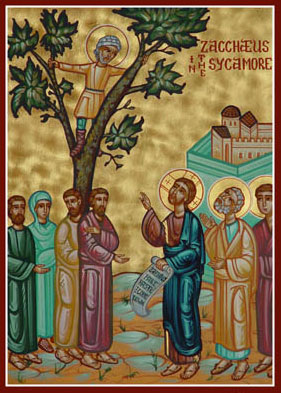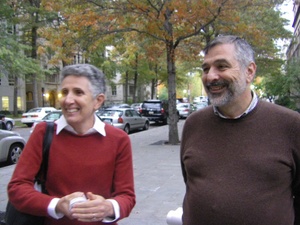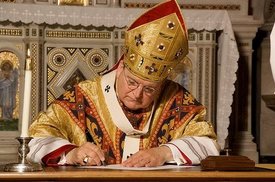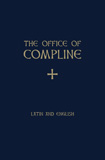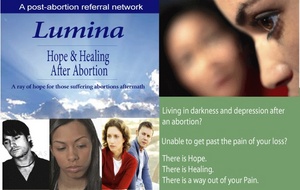The Church in Baghdad has faced another crisis with the murder of 7 and wounding of many more during the Divine Liturgy in Baghdad today. Reports seem to conflict: as many as 47 are reported dead including 2 priests.
Zacchaeus had the opportunity of a lifetime
When man seeks God, then is truly free… Pope recalls the teaching of Roman Guardini
H2O News has a short video clip on the Guardini Foundation meeting with the Pope.
Spouses are to help each other follow a path of sanctity, Pope Benedict teaches
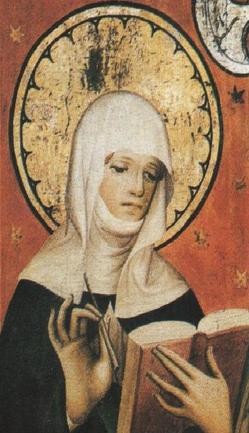 On Wednesday, October 27, Pope Benedict XVI noted that in
On Wednesday, October 27, Pope Benedict XVI noted that in
the Great Jubilee of the Year 2000, the Venerable Servant of God John Paul II
proclaimed Saint Bridget of Sweden (1303-1373), co-patroness of the whole of
Europe. It’s the hope of all of us, as Benedict indicated, that Saint Bridget
“…can intercede effectively before God, to obtain the much-awaited grace of the
full unity of all Christians. We want to pray … for this same intention, which
we consider so important, so that Europe will be able to be nourished from its
own Christian roots, invoking the powerful intercession of St. Bridget of
Sweden, faithful disciple of God, co-patroness of Europe.”
Pope noted something that I think is quite interesting, perhaps quite bold to
say, even if it is the teaching of the Church, that married couples are to help
each other get to heaven: “to advance in the Christian life.” Our Catholic
teaching on marriage is that man and woman are to form a “conjugal
spirituality” that is “follow a path of sanctity.” The two pertinent paragraphs
of a longer address are here:
religious who initiated her in the study of the Scriptures, exercised a very
positive influence on her own family that, thanks to her presence, became a
true “domestic church.” Together with her husband, she adopted the
Rule of the Franciscan Tertiaries. She practiced works of charity towards the
indigent with generosity; she also founded a hospital. Together with his wife,
Ulf learned to improve his character and to advance in the Christian life. On
returning from a long pilgrimage to Santiago de Compostela, taken in 1341 with
other members of the family, the spouses matured the plan to live in
continence, but shortly after, in the peace of a monastery to which he had
retired, Ulf concluded his earthly life.
helps us to appreciate what today we could define an authentic “conjugal
spirituality”: Together, Christian spouses can follow a path of sanctity,
supported by the grace of the sacrament of Marriage. Not infrequently, as
happened in the lives of St. Bridget and Ulf, it is the wife who with her
religious sensibility, with delicacy and gentleness, is able to make the
husband follow a path of faith. I am thinking, with recognition, of so many
women who, day in day out, still today illumine their families with their
testimony of Christian life. May the Spirit of the Lord fuel the sanctity of
Christian spouses, to show the world the beauty of marriage lived according to
the values of the Gospel: love, tenderness, mutual help, fecundity in
generating and educating children, openness and solidarity to the world,
participation in the life of the Church.”
Understanding Catholic faith & public life, no split necessary
Come to Jesus. There is no sensible reason why there has to be split in thinking and acting when it comes to saying you believe in Christ and follow His Church and being a serious voter or a politician. Today we hear politicians and sadly some clergymen, are not steadfast to the life and teaching of Jesus Christ. They are often working out of a pretext of religion without the substance of the Faith.
Abortion and breast cancer: a race to the truth
A few weeks ago I posted a brief piece on Komen Foundation giving funds to Planned Parenthood. Today, Zenit.org ran an article “Race for the Truth About the Susan G. Komen Foundation: Is Abortion and Hormonal Contraception a Prescription for Breast Cancer?” by Jenn Giroux, the executive director of Human Life International in America. Sometimes I wonder when the truth will be revealed!
Office of Compline, edited by Fr Samuel Weber
Edited by Fr. Samuel F. Weber, OSB
$18.95 USD
Foreword by Archbishop
Raymond L. Burke
From Ignatius Press:
This volume contains the Office of
Compline for every day of the year, in Latin and English, according to the
novus ordo of the Roman Catholic Church, with Gregorian Chant settings. On the
facing pages for the Latin, the official English text is also arranged for
chanting, using simple English tones. New translations have been made for the
official hymns of the Office, and all the hymns are given with the Gregorian
melodies proper for each season and feast of the liturgical year.
This book
will find a welcome in parishes, cathedrals, religious communities and
seminaries, as well as families, all who wish to pray together at the end of
the day.
Complete instructions are given for praying Compline. The Foreword by
Archbishop Raymond Burke explains the rich spiritual tradition of prayer at the
close of day, and provides an inspiring meditation on the texts and meaning of
the Office of Compline.
The scriptures give only one command concerning the
frequency of prayer: pray without ceasing (Lk 18:1; 1 Thess 5:17). This volume
will prove to be a welcome companion to all who are seeking to make a full
response to the Gospel, and persevere in unceasing prayer.
The editor, Fr. Samuel Weber, is a Benedictine priest and monk of the Archabbey of Saint Meinrad and is the Director of the Institute of Sacred Music in the Archdiocese of Saint Louis
Healing after Abortion
The task of science was AND remains a patient, passionate search for truth about the cosmos, nature, the constitution of the human being, Pope tells us
For those who think that the Catholic Church, orthodox Catholic theology, the Pope, or any right-thinking Catholic person in the 21st century is against science: think again. Take your head out of the sand; do some reading. Today, His Holiness address the distinguished members of the Pontifical Academy of Sciences meeting for their plenary assembly. The theme they’ve chosen to explore is “The Scientific Legacy of the Twentieth Century.”
Two papal hopes for future scientists: “the need for an interdisciplinary approach tied with philosophical reflection” and that the work of science “always be informed by the imperatives of fraternity and peace, helping to solve the great problems of humanity, and directing everyone’s efforts towards the true good of man and the integral development of the peoples of the world.”
Benedict addressed the following text to 80 scientists:
The history of science in the twentieth century is one of
undoubted achievement and major advances. Unfortunately, the popular image of
twentieth-century science is sometimes characterized otherwise, in two extreme
ways. On the one hand, science is posited by some as a panacea, proven by its
notable achievements in the last century. Its innumerable advances were in fact
so encompassing and so rapid that they seemed to confirm the point of view that
science might answer all the questions of man’s existence, and even of his
highest aspirations. On the other hand, there are those who fear science and
who distance themselves from it, because of sobering developments such as the
construction and terrifying use of nuclear weapons.
Science, of course, is not
defined by either of these extremes. Its task was and remains a patient yet
passionate search for the truth about the cosmos, about nature and about the
constitution of the human being. In this search, there have been many successes
and failures, triumphs and setbacks. The developments of science have been both
uplifting, as when the complexity of nature and its phenomena were discovered,
exceeding our expectations, and humbling, as when some of the theories we
thought might have explained those phenomena once and for all proved only
partial. Nonetheless, even provisional results constitute a real contribution
to unveiling the correspondence between the intellect and natural realities, on
which later generations may build further.
The progress made in scientific
knowledge in the twentieth century, in all its various disciplines, has led to
a greatly improved awareness of the place that man and this planet occupy in
the universe. In all sciences, the common denominator continues to be the notion
of experimentation as an organized method for observing nature. In the last
century, man certainly made more progress – if not always in his knowledge of
himself and of God, then certainly in his knowledge of the macro- and
microcosms – than in the entire previous history of humanity. Our meeting here
today, dear friends, is a proof of the Church’s esteem for ongoing scientific
research and of her gratitude for scientific endeavour, which she both
encourages and benefits from. In our own day, scientists themselves appreciate
more and more the need to be open to philosophy if they are to discover the
logical and epistemological foundation for their methodology and their
conclusions. For her part, the Church is convinced that scientific activity
ultimately benefits from the recognition of man’s spiritual dimension and his
quest for ultimate answers that allow for the acknowledgement of a world
existing independently from us, which we do not fully understand and which we
can only comprehend in so far as we grasp its inherent logic. Scientists do not
create the world; they learn about it and attempt to imitate it, following the
laws and intelligibility that nature manifests to us. The scientist’s
experience as a human being is therefore that of perceiving a constant, a law,
a logos that he has not created but that he has instead observed: in fact, it
leads us to admit the existence of an all-powerful Reason, which is other than
that of man, and which sustains the world. This is the meeting point between the
natural sciences and religion. As a result, science becomes a place of
dialogue, a meeting between man and nature and, potentially, even between man
and his Creator.
As we look to the twenty-first century, I would like to
propose two thoughts for further reflection. First, as increasing
accomplishments of the sciences deepen our wonder of the complexity of nature,
the need for an interdisciplinary approach tied with philosophical reflection
leading to a synthesis is more and more perceived. Secondly, scientific
achievement in this new century should always be informed by the imperatives of
fraternity and peace, helping to solve the great problems of humanity, and
directing everyone’s efforts towards the true good of man and the integral
development of the peoples of the world. The positive outcome of twenty-first
century science will surely depend in large measure on the scientist’s ability
to search for truth and apply discoveries in a way that goes hand in hand with
the search for what is just and good.
Subjected to the spirit, the body will be sexual in eternal life, according to Aquinas
The liturgical year of the Church brings to the front burner of the spiritual life a number of things at this time of year: questions about salvation, death, hell, heaven, purgatory, Christ’s kingship, conversion, and the like. In fact, a central piece of our spiritual work in the School of Community (of Communion and Liberation) right now is understanding what it means to convert, to live in spirit of conversion, to live as though we REALLY believe in Christ, turning away from sin, and turning toward the Lord. Father Julian Carron is hitting members of Communion and Liberation pretty hard with the call to conversion. However, if truth be told, Father Carron is taking his cue from Pope Benedict. Nevertheless, on the human level, for finite beings we have to be concerned with such things because we don’t live forever, just in case you didn’t know this fact; we are rightly concerned now because once we’re dead, there is no way of making a conversion (sorry, there is no reincarnation).
A professor at the Institute of Philosophy and Theology of Shkodër (Albania), Jesuit Father Mario Imperatori, wrote an essay that caught my eye, “Eschatology and Resurrection of the Body in St. Thomas Aquinas,” published in the current issue of La Civiltà Cattolica (issue # 3849; pp. 257-268). As you know, this periodical is reviewed by the Secretary of State of the Holy See prior to publication.
In the article, Father Imperatori argues, “St. Thomas’s doctrine regarding glorified bodies
is based on the resurrection of the flesh, interpreted in an
anti-spiritualistic manner. For him, in fact, the intellectual soul is the
unique and subsisting shape of the human being; after the resurrection carried
out by God, the body too will share with the soul the same incorruptibility and
bliss; it will be a spiritual body not because it becomes spirit, but because
everything will be subjected to the spirit. Aquinas adds that the human body,
because of its wholeness, will continue to be sexual, despite the absence of
procreation. The Eschatology of St. Thomas has proven controversial, but it has
the merit of asserting the bodily-spiritual reality of man as the ultimate
purpose of creation.”
So, the human body will relate as a sexual being in the eternal life. Interesting. Thanks for letting me know. What joy that will be, don’t you think? I wonder what relating sexually means for a glorified body.
